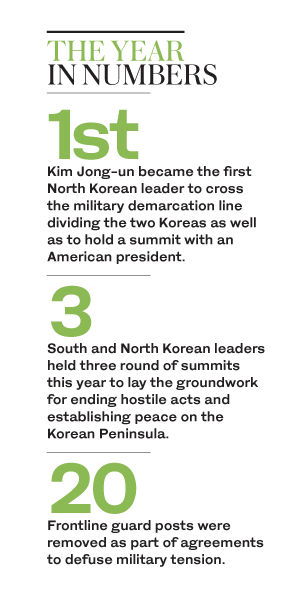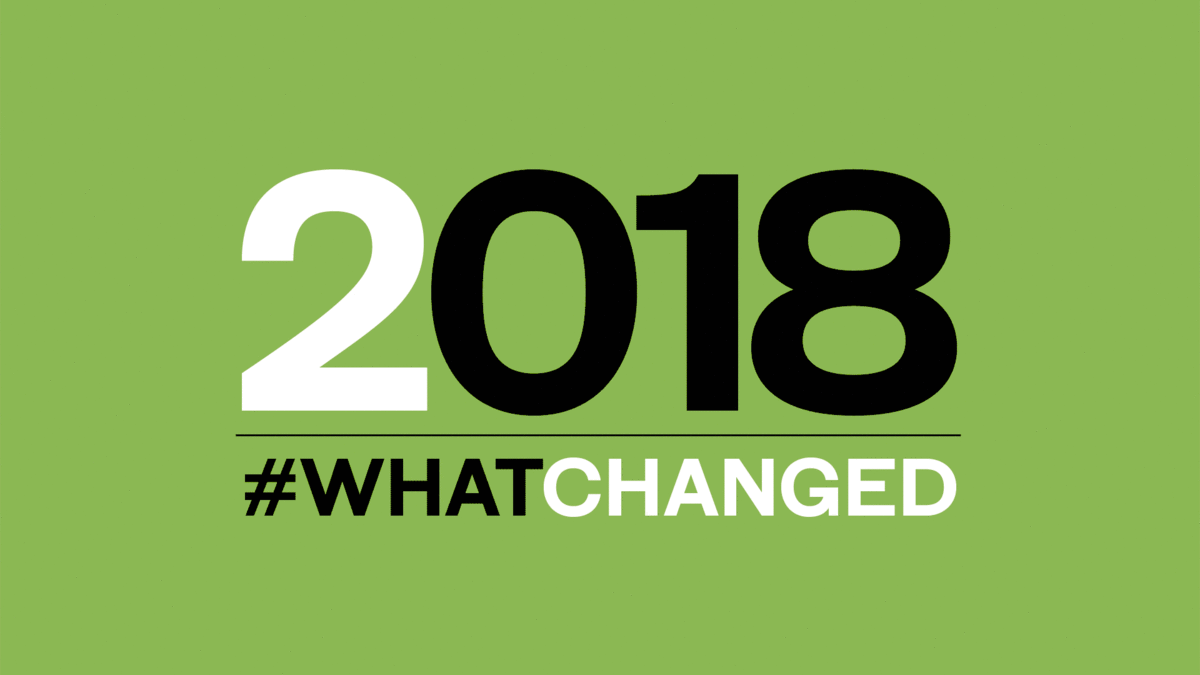SEOUL: The Moon Jae-in administration’s strenuous effort to engage North Korea laid the groundwork for inter-Korean rapprochement throughout the year despite lingering worries over Pyongyang’s nuclear threat.
Three rounds of historic summit talks between President Moon and North Korean leader Kim Jong-un highlighted the unprecedented peace mood on the Korean Peninsula, which has been divided since the 1950 — 1953 Korean War. The war ended in a truce, not a permanent peace treaty.
The first Moon-Kim summit at the truce village of Panmunjom in the Demilitarized Zone on April 26 was in the global spotlight, as the face-to-face meeting was seen as a success following years of Pyongyang’s nuclear provocations.
While holding hands, the two leaders stepped across the Military Demarcation Line, raising hopes of ending conflicts and bringing peace on the peninsula. Kim became the first North Korean leader to set foot in the South territory.
Speaking after the summit to the media, Moon and Kim issued the so-called Panmunjom Declaration to usher in a “new era of peace.”
 The two leaders agreed to cease all hostile acts and work toward establishing a peace regime in place of the current armistice treaty, which had been signed by the US, China and North Korea at the end of the Korean War.
The two leaders agreed to cease all hostile acts and work toward establishing a peace regime in place of the current armistice treaty, which had been signed by the US, China and North Korea at the end of the Korean War.
“We bade farewell to the frozen relationship between North and South Korea, which was a nightmare. And we announced the beginning of a warm spring to the world,” Kim Jong-un said during a press conference.
The Panmunjom summit became the catalyst for the landmark June 18 summit in Singapore between the leaders of the US and North Korea.
At the one-day talks, US President Donald Trump and North Korea’s Kim signed a document in which both committed to work toward the “complete denuclearization of the Korean Peninsula.”
Trump announced that US-South Korean military drills would be suspended to help facilitate denuclearization talks with North Korea. In return, Kim pledged to destroy a missing engine testing site as a step toward removing its nuclear arms following the destruction of the Punggye-ri nuclear site in May.
While the US and North Korea, however, were in a tug-or-war over detailed procedures for denuclearization after the Singapore summit, President Moon was further accelerating efforts to move forward the inter-Korean relationship.
Following a brief summit with Kim at the northern part of the truce village, about 200 separated families from South and North Korea reunited at the Mt. Geumgang resort in the North in August, the first such reunions since 2015.
Moon flew to Pyongyang in September for his third get-together with Kim. During the three days of summit from Sept. 18 to 20 in the North Korean capital, both leaders agreed on a set of sweeping measures to ease military tension along the Demilitarized Zone and reboot cross-border business projects.
“The tension-reducing agreements are meaningful and practical steps toward declaring an end to the Korean War since the two militaries began disarming hot spots for conflicts and turning them into peaceful spots,” Yang Moo-jin, a professor at the University of North Korean Studies in Seoul, told Arab News. The militaries of both Koreas completed withdrawing troops and firearms from 20 front-line guard posts (GPs) — 10 from each side — in early November and subsequently destroyed the watchtowers. South Korea has 60 more such guard posts whereas North Korea is believed to have 160 more.
Both militaries also finished removing firearms and troops from the Joint Security Area at Panmunjom, where South and North Korean armed troops used to stand face-to-face.
“This irreversible destruction of GPs is the most visible and symbolic effort to prevent accidental clashes between the two militaries and build mutual trust,” Gen. Kim Yong-woo, chief-of-staff of the Republic of Korean Army, said during his visit to the GP destruction site near the border on Nov.12.
Preparations for reconnecting cross-border railways are under way. On Nov. 30, a South Korean train with a sign reading “Seoul to Shinuiju” crossed into the North for a long-stalled joint inspection of railway sections there.
It was the first time in a decade that a South Korean train has traveled on rail tracks in the North.
Both Koreas plan to hold a groundbreaking ceremony for the railway reconnection project on Dec. 26 after completing the 18-day inspection of the lines on the west and east coast.
In spite of tangible progress on inter-Korean relations, however, the talks over North Korea’s denuclearization have been in a prolonged stalemate due mainly to disagreements over the terms of denuclearization.
Washington is holding fast to its policy of exerting maximum economic pressure on North Korea though President Trump has claimed progress in denuclearizing the North. In the latest move to squeeze the North, the US Treasury Department blacklisted three top aides to Kim Jong-un over serious rights abuses and censorship.
North Korea experts here believe the timetable for the North’s denuclearization should be amended inevitably because of the deadlock in the US-North Korea nuclear disarmament talks.
“North Korea is believed to be in a dilemma over how to respond to the US sanctions and implement the denuclearization pledge agreed upon at the Singapore summit,” said Hong Min, a researcher at the state-funded Korea Institute for National Unification.
“Attention is now on the new year’s message of Kim Jong-un,” Hong said, adding that the North Korean leader could issue a fresh message to break the nuclear deadlock.
 On the contrary, should Kim send a negative message on the denuclearization process, the peace initiative led by President Moon could collapse, said Cho Sung-ryul, a senior researcher at the Institute for National Security Strategy.
On the contrary, should Kim send a negative message on the denuclearization process, the peace initiative led by President Moon could collapse, said Cho Sung-ryul, a senior researcher at the Institute for National Security Strategy.
“We should brace for a negative situation in which the North Korean leader sends a skeptical message on his nuclear pledge,” Cho said. As skepticism about the North’s denuclearization effort grows among American lawmakers, Trump’s “top-down” initiative of engaging the North could not work anymore, he said.
If and when the North Korean leader will make his return visit to Seoul is a matter of primary concern. When Moon met Kim in Pyongyang, the North Korean leader agreed to visit Seoul at an early date, but he has yet to accept Moon’s invitation to visit by the end of December.
The South Korean government was preparing for Kim’s December visit with a large artwork showing the two leaders smiling and shaking hands being installed outside the presidential Blue House.
South Korean citizens have been divided over the North Korean dictator’s visit to Seoul.
A group of young citizens called “welcome committee for a great man” leads a campaign to encourage Kim’s visit with a slogan of “I am a fan of Kim Jong-un.”
Other groups of conservative citizens are engaged in a counterattack campaign to “expel Kim Jong-un.”
With only two weeks to, however, Blue House officials have acknowledged that Kim would not be able to come to Seoul within this year.
Said Yim Jae-cheon, an associate professor of North Korean studies at Korea University in Seoul, said: “If it happens, I expect Kim’s Seoul visit would likely be made before the second summit of Trump and Kim. That’s because the inter-Korean summit in Seoul could certainly serve as a stepping stone for the US-North Korean summit.”

























